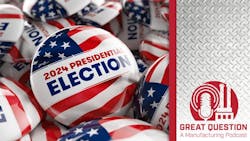Podcast: How the 2024 election may impact manufacturing
Karen Langhauser is chief content director at Pharma Manufacturing and has 20+ years of experience in the B2B manufacturing space. Andy Hanacek is senior editor at Food Processing and has covered meat, poultry, bakery, and snack foods during his decades-long tenure in the industry. Bob Vavra is senior content director for Machine Design and Power & Motion. He has covered all aspects of manufacturing and is a regular attendee at events such as IMTS and Hannover Messe. These industry experts recently spoke with Laura Putre, senior editor of IndustryWeek, about how the 2024 elections will impact manufacturing.
Below is an excerpt from the podcast:
IW: First, let's talk about regulations. Karen, do you want to start and maybe talk a little bit about some new legislation that would make it harder for drug companies to import certain chemicals from China. I know there's a couple of issues going on.
KL: Yeah, actually, we’ve got to back up a little bit. Both candidates have really taken their swing at Big Pharma. You know, it's a popular target. Drug pricing in particular is in the political crosshairs. So the candidates are mostly looking at taking on drug pricing by reducing government spending on Medicare. The Inflation Reduction Act, the IRA, it's really the centerpiece of Biden's economic strategy. And it's also one of the most aggressive drug pricing laws the pharma industry has seen in a long time. Even though the IRA is mostly focused on domestic energy production and clean energy, there's a tenant of the law that looks to lower prescription drug costs by allowing Medicare to negotiate prices with drug companies by putting in inflationary caps on prices. So the first 10 drugs up for negotiations were identified last year, and Medicare is aiming to select, I think, 60 more drugs over the next four years. So, not surprisingly, the pharma industry is not happy. Several pharma companies, as well as the industries’ largest groups, have challenged the constitutionality of the law in court, so far without success. So it does appears as though it's here to stay.
While Trump has repeatedly attacked the IRA's climate and energy provisions (he's not a fan of electric vehicles, if you might have heard), it's not clear if he would push for legislative changes to the drug negotiations portion during his presidency. He had put an executive order in place known as the Most Favored Nations Proposal, where Medicare would be able to buy drugs at the lowest price that a drug manufacturer sells them in a country of comparable GDP, with the idea that Americans shouldn't be paying more for drugs than other developed nations. So when he put that in place right at the end of this term and the pharma industry trade groups sued to stop it, it got tied up in court and it never survived the next administration. But Trump has promised that if he's elected, he's going to reinstate that order. So either way, no matter who's in the White House, it looks like drug pricing is the first thing that's going to be addressed.
IW: Andy, let's take it over to you. What regulations are you focusing on coming down the pipeline in the food industry?
IndustryWeek is the premier online source of news and information on manufacturing, leadership, continuous improvement, talent management and other issues critical to industry."
AH: Yeah. Under Donald Trump, regulations were relaxed. It was more of a deregulatory world back then, and that's become evident only because in the last few years, it seems like regulatory efforts have been stepped up. Now it's an interesting point because the states are actually probably doing, depending on which side of the coin you're on, a better or more annoying job of going after some of these regulations, not waiting for the federal government to make moves, if you will. A good example is the recent rush to ban things like certain food additives. The state of California has already banned things like red dye #3 and other additives. And other states have followed suit with proposed bans. Not all of them have gone through the legislative system yet, but there are all these states jumping up and kind of running ahead of the government, the federal government, to regulate these things if not ban them outright in food products.
One of the more interesting regulatory moves in the last year that we've been watching was the EPA has come out and I guess again, depending on which side of the coin you're on, finally worked to reword and update the wastewater effluent guidelines for meat and poultry plants. And this was a big concern most of last year. What are they going to do? How are they going to regulate things? Is it going to affect these smaller processors because, you know, putting in new wastewater systems and ways to treat your wastewater, that's not pocket change. And if you're going to regulate this more thoroughly and put in more stringent rules, we've got to take into account the size of the processor. So moving forward, you know, I fully expect that if President Biden continues and wins another term, the regulatory environment will stay enhanced as it was. The FDA has improved it's Human Foods Program as well under Biden, which for a long time the FDA kind of talked about but never really did much around it. Whereas under President Trump, if it happens, I think you're going to see some of that regulatory environment ease off on food again.
IW: Bob, let's bring you into the conversation. Is there anything you want to say about regulations?
BV: There are a couple of things on regulation. Two things to remember. 1) 90% of your manufacturers in this country are considered small- to mid-size manufacturers. So the onus of regulation weighs more heavily on them. But we're talking about standards and compliance. Regulation is what happens when you don't meet standards. If you look at not just the past two administrations but going back into the 70s and 80s, generally, Democratic administrations have been in favor of enforcement, particularly when it comes to occupational health and safety, and Republican administrations have been based on compliance. That pendulum has been swinging back and forth for 20 years. So obviously there's a lot of confusion for a lot of manufacturers on that front. I think the issue that NAM is trying to talk about is can we streamline some of the more onerous regulations on small businesses that create a disproportionate amount of cost to them without generating any value? That's a legitimate concern. But at the same time, NAM has to be in charge of pushing standards to all of their members, including the small- to mid-sized companies so that the need for regulation is diminished rather than increased.
About the Podcast
Great Question: A Manufacturing Podcast offers news and information for the people who make, store and move things and those who manage and maintain the facilities where that work gets done. Manufacturers from chemical producers to automakers to machine shops can listen for critical insights into the technologies, economic conditions and best practices that can influence how to best run facilities to reach operational excellence.
Listen to another episode and subscribe on your favorite podcast app
About the Author
Laura Putre
Senior Editor Laura Putre manages IW contributors and covers leadership as it applies to executive best practices, corporate culture, corporate responsibility, growth strategies, managing and training talent, and strategic planning. A former newspaper journalist, Laura has written for Slate, The Root, the Chicago Tribune, the Guardian and many other publications.




